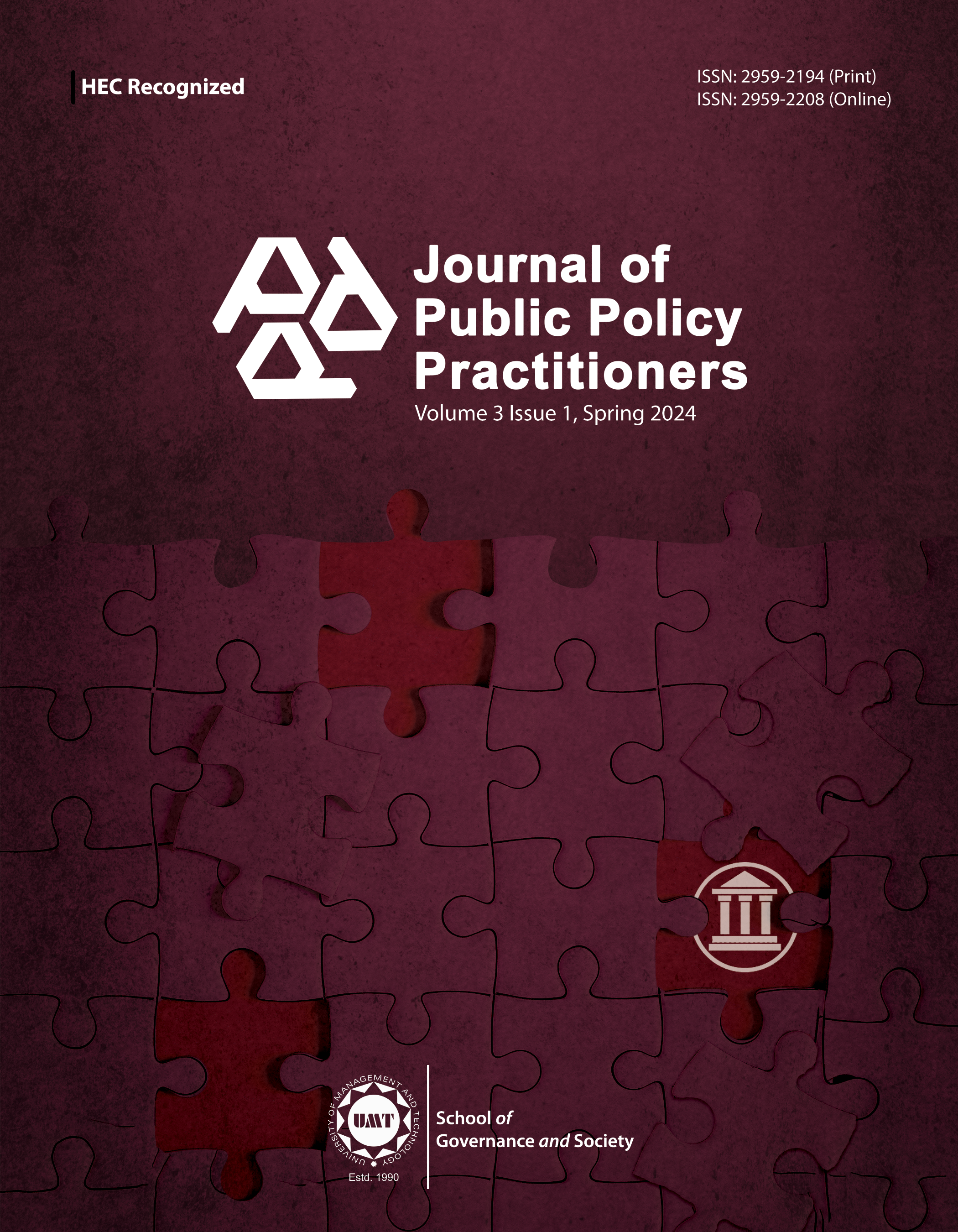Analysis of the Education Policies of Pakistan: Identifying Factors Behind its Shortcomings and Failure to Achieve Goals
Abstract
 Abstract Views: 0
Abstract Views: 0
Education is critical for personal and national development, influencing economic growth, social progress, and cultural preservation. Since gaining independence in 1947, Pakistan has worked to establish an effective education system, yet literacy rates remain low. Early efforts, such as the 1947 National Education Conference, were hampered by the challenges of post-partition circumstances. Currently, Pakistan's education system confronts a number of issues, including limited finance, poor educational quality, socio-cultural hurdles, and major urban-rural inequities. Understanding these concerns is vital for understanding the continued struggles to meet educational needs. Data for this study was collected from secondary sources. It concluded that significant obstacles to educational policy include socio-cultural barriers, poor quality of education, inadequate funding, and inconsistent policy implementation. The findings underscore the need for evidence-based strategies and comprehensive reforms to address these issues effectively. This research contributes to the broader discourse on educational policy by highlighting actionable recommendations and proposing a framework for successful policy development and implementation, ultimately aiming to enhance the quality and equity of education in Pakistan.
Downloads
References
Agarwal, K., & Chanda, A. (2022). Early childhood education and care: An India perspective. Specialusis Ugdymas, 1(43), 9228–9238.
Ahmed, M., & Khan, A. M. (2020). Analysis of national educational initiatives (2000-2019) for promoting primary education in Pakistan. Journal of Educational Research, 23(1), 131–146.
Akram, H. (2020). Education governance in Pakistan: A critical analysis of challenges. Journal of Social Sciences Advancement, 1(1), 38–41.
Akram, H., & Yang, Y. (2021). A critical analysis of the weak implementation causes on educational policies in Pakistan. International Journal of Humanities and Innovation, 4(1), 25–28. https://doi.org/10.33750/ijhi.v4i1.104
Akther, J. (2020). Influence of UNESCO in the development of lifelong learning. Open Journal of Social Sciences, 8(3), 103–112. https://doi.org/10.4236/jss.2020.83010
Ashraf, M. A., Turner, D. A., & Laar, R. A. (2021). Multilingual language practices in education in Pakistan: The conflict between policy and practice. Sage Open, 11(1), 1–14. https://doi.org/10.1177/21582440211004140
Asif, S., Afzal, I., & Bashir, R. (2020). An analysis of medium of instruction policies in the education system of Pakistan with specific reference to English medium education. Sir Sayed Journal of Education & Social Research, 3(2), 370–382. https://doi.org/10.36902/sjesr-vol3-iss2-2020(370-382)
Bakhsh, K., Niazi, S., Hafeez, M., & Tahir, S. H. (2021). Social and educational challenges regarding the promotion of higher education in Pakistan: An analytical study. WSEAS Transactions on Environment and Development, 17, 1124–1132. https://doi.org/10.37394/232015.2021.17.104
Batool, S., & Hina, K. (2022). Need analysis of quality education indicators at secondary level in Pakistan: A prospective study. Global Educational Studies Review, 7(2), 82–96. http://doi.org/10.31703/gesr.2022(VII-II).08
Elfert, M., & Ydesen, C. (2023). Global governance of education: The historical and contemporary entanglements of UNESCO, the OECD and the World Bank (Vol. 24). Springer Nature.
Gohar, S., & Sumayya, H. S. (2023). Challenges to Pakistan economy during Zardari era, 2008-2013: An overview. International Journal of Human and Society, 3(3), 15–21.
Hassan, H. (2022). Social implications of corruption in developing countries: Case study of Pakistan and India. Central European Journal of Public Policy, 16(1), 1–13. http://doi.org/10.2478/cejpp-2022-0003
Ismail, I., Fathonih, A., Prabowo, H., Hartati, S., & Redjeki, F. (2020). Transparency and corruption: does e-government effective to combat corruption? International Journal of Psychosocial Rehabilitation, 24(4), 5396–5404.
Khan, I. U., Rahman, G., & Hamid, A. (2021). Poststructuralist perspectives on language and identity: Implications for English language teaching research in Pakistan. Sir Sayed Journal of Education & Social Research, 4(1), 257–267. https://doi.org/10.36902/sjesr-vol4-iss1-2021(257-267)
Khan, M., Khan, G., & Muhammad, N. (2022a). Barriers to girl’s education in Khyber Pakhtunkhwa, Pakistan: A case study of South Waziristan, Tehsil Makeen. The Discourse, 8(2), 1–15.
Khan, R., Li, H., Basir, M., Chen, Y. L., Sajjad, M. M., Haq, I. U., Ullah, B., Arif, M., & Hassan, W. (2022b). Monitoring land use land cover changes and its impacts on land surface temperature over Mardan and Charsadda Districts, Khyber Pakhtunkhwa (KP), Pakistan. Environmental Monitoring and Assessment, 194(6), Article e409. https://doi.org/10.1007/s10661-022-10072-1
Lingard, B. (2020). Globalisation and education: Theorising and researching changing imbrications in education policy. In B. Lingard (Ed.), Globalisation and education (pp. 1–27). Routledge.
Murtaza, K. G., & Hui, L. (2021). Higher education in Pakistan: challenges, opportunities, suggestions. Education Quarterly Reviews, 4(2), 213–219. https://doi.org/10.31014/aior.1993.04.02.211
Riaz, P., & Zaidi, S. S. Z. (2023). The impact of expatriate remittances on economic growth in Pakistan Economy. International Journal of Social Science & Entrepreneurship, 3(2), 181–206. https://doi.org/10.58661/ijsse.v3i2.145
Rizvi, F., Lingard, B., & Rinne, R. (2022). Reimagining globalization and education: an Introduction. In F. Rizvi, B. Lingard & R. Rinne (Eds.), Reimagining globalization and education (pp. 1–10). Routledge.
Tahira, M., Hassan, A., Malik, A., & Yousuf, M. I. (2020). Teacher education in Pakistan: Issues and problems. ERIC. https://files.eric.ed.gov/fulltext/ED608314.pdf
Tusinska, M. (2020). Inequality of opportunity–gender bias in education in Pakistan. Social Inequalities and Economic Growth, 63, 233–245. https://doi.org/10.15584/nsawg.2020.3.11
Uddin, I., Khan, A. R., & Ghani, F. (2021). Impediments to women higher education in Pakistan: A case study of district Chitral. Pakistan Journal of Educational Research, 4(1), 198–218. https://doi.org/10.52337/pjer.v4i1.149
Ulain, N., & Hussain, F. (2020). Fighting governmental corruption in Pakistan: An evaluation of anti-corruption strategies. Croatia and Comparative Public Administration: Journal of Theory and Practice of Public Administration, 20(3), 439–468.
UNESCO, The World Bank, & UNICEF. (2021). The state of the global education crisis: A path to recovery. https://doi.org/10.54675/JLUG7649
Zapp, M. (2021). The authority of science and the legitimacy of international organisations: OECD, UNESCO and World Bank in global education governance. Compare: A Journal of Comparative and International Education, 51(7), 1022–1041. https://doi.org/10.1080/03057925.2019.1702503
Zubairi, A., Halim, W., Kaye, T., & Wilson, S. (2021). Country-level research review: EdTech in Pakistan. The World Bank. https://doi.org/10.5281/zenodo.4596486
Copyright (c) 2024 Zerish Tasleem and Zermina Tasleem

This work is licensed under a Creative Commons Attribution 4.0 International License.







